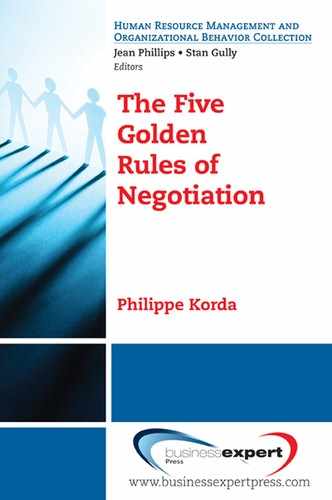In the Restaurant
Carl RITCHIE: You know, my sales director still moans at me for agreeing to that sale at $97.50 per square meter.
Margaret PEAKE: He’s wrong. You fought your corner well.
Carl RITCHIE: That’s true. But I feel that I made a mistake when I responded to your attack by counterbidding at $99.
Margaret PEAKE (amused): Really?
Carl RITCHIE (concentrating, seeking to collect his thoughts): Yes. It was as if I’d wasted my ammunition in a split-second!
Margaret PEAKE (nodding her head): Yes, there’s no doubt you gave away $1 for nothing.
Carl RITCHIE: For nothing? One dollar was a lot of money to me!
Margaret PEAKE: But Carl, you gave that $1 up so quickly that it meant nothing to me: It just made me think that you could go much further.
Carl RITCHIE: Yet technically my product was excellent—and well suited to your needs. What was I supposed to do?
Margaret PEAKE: As buyers, we always have a certain “power to say no” to the seller. There is just one moment when that power is transferred into the seller’s hands: That is when we ask him to “make an effort” on the price or the terms.
Carl RITCHIE: I see! It’s like a “minute of power” for the seller.
Margaret PEAKE: When the seller immediately responds with a counterbid—as you did at $99—we breathe a sigh of relief! We then regain “the power to say no”!
Carl RITCHIE: That’s just what happened to me.
Margaret PEAKE: Whereas if the seller turns a deaf ear and simply continues to make his case—on the products, the service, or whatever—he puts us in a difficult position, making us repeat our request—and we are often obliged to adopt a more flexible stance.
Carl RITCHIE: And if he ends up offering you $1 off?
Margaret PEAKE: Then that $1 really means something!
